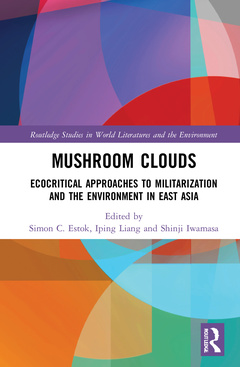Mushroom Clouds Ecocritical Approaches to Militarization and the Environment in East Asia Routledge Studies in World Literatures and the Environment Series
Coordonnateurs : Estok Simon C., Liang Iping, Iwamasa Shinji

Mushroom Clouds: Ecocritical Approaches to Militarization and the Environment in East Asia examines the growing significance of the eco-implications of the increasing militarism of East Asia. As a transcultural image and metaphor, mushroom clouds signify anthropogenic violence and destruction, as exemplified by wars and nuclear bombings. Immediately evoking memories of Hiroshima and Nagasaki, the mushroom clouds metaphor has deep roots and implications in East Asia, and this volume explores these roots and implications from the perspectives of a variety of scholars and artists from different parts of East Asia. The chapters that comprise Mushroom Clouds respond to the increasingly dangerous developments in the world that led up to and have occurred since the 2016 presidential election of Donald Trump, developments that threaten the stability of the region and the world. In the wake of the 70th anniversary of the division of Korea, increasing attention has been focused on the legacy of the Cold War, on the one hand, and on the continuing militarization of East Asia, on the other. After the nuclear bombings in Hiroshima and Nagasaki, after the truce across the 38th parallel, after the shelling of Kinmen and Matsu, East Asia became (and remains) one of the most densely militarized regions in the world. Under the shadow of war, however, the concern about environmental impacts has been growing, not only in social discourse but also in literature and the visual arts. The first of its kind, Mushroom Clouds gathers ecocritics from East Asia to examine issues such as militarization, militarized islands, military tourism, military villages, post-war environments, nuclear accidents, and the demilitarized sone (DMZ) wildlife, among others, in East Asia.
Chapter 1: Nature under Ideological and Utopian Seizures: Recent Political and Conservationist Discourses and Literary Representations of the Korean DM, By Doo-ho Shin
Chapter 2: Human No-Go Zones: Theatricalizing Unintentional and Intentional Wildlife Sanctuaries, By Catherine Diamond
Chapter 3:Blue Blood: A "Silent War" at the Edge of the Sea, By Weibon Wu
Chapter 4: Radiation Ecologies, Resistance, and Survivance on Pacific Islands: Albert Wendt’s Black Rainbow and Syaman Rapongan’s Drifting Dreams on the Ocean, By Hsinya Huang and Syaman Rapongan
Chapter 5: The Lineage of Nuclear Narratives in the Discourses of Terry Tempest Williams, Fumiyo Kouno, and Barack Obama, By Shinji Iwamasa
Chapter 6: The Peaceful Use of Nuclear Power and Post-3/11 Novels, By Koichi Haga
Chapter 7: Plant Memories: Hibiscuses, Bamboo Fences, and Environmental Mourning of Military Villages in Taiwan, By Iping Liang
Chapter 8: Food Ethics and GMOs in Margaret Atwood's Oryx and Crake and Paolo Bacigalupi’s The Windup Girl, By Young-hyun Lee
Chapter 9: Detachment and Division: Militarization, Geography, and Gender in The Windup Girl, By Simon Estok
Chapter 10: "Seeing Connections": An Ecofeminist Peace Study of Mingyi Wu’s The Stolen Bicycle, By Kathryn Yalan Chang
Chapter 11: In Search of a New Representation of Nature in Post-war Japanese Literature, By Kazuaki Odani
Simon C. Estok (editor-in-chief) currently holds the award of Foreign Expert of the Double First Class Discipline Cluster (2018-2021) at Sichuan University and was the recipient of the Shanghai Metropolitan Government "Oriental Scholar" Award (東方學者) (2015-18) at the Research Center for Comparative Literature and World Literatures at Shanghai Normal University. Estok is a full professor and Senior Research Fellow at Sungkyunkwan University (South Korea’s first and oldest university). He teaches literary theory, ecocriticism, and Shakespearean literature. His award-winning book Ecocriticism and Shakespeare: Reading Ecophobia appeared in 2011 (reprinted 2014), and he is co-editor of four books: Anthropocene Ecologies of Food: Implications and Perspectives from the Global South (Routledge, 2021), Landscape, Seascape, and the Eco-Spatial Imagination (Routledge, 2016), International Perspectives in Feminist Ecocriticism (Routledge, 2013), and East Asian Ecocriticisms (Macmillan, 2013). His much anticipated The Ecophobia Hypothesis was published in 2018 by Routledge and reprinted (with errata) as a paperback in July 2020. Estok has published extensively on ecocriticism and Shakespeare in such journals as PMLA, Mosaic, Configurations, English Studies in Canada, and others.
Iping Liang is Professor of English and American Studies at National Taiwan Normal University, Taiwan. She is currently president of the Association for the Study of Literature and Environment, Taiwan (ASLE-Taiwan) and organized the 2018 International Symposium on Literature and Environment, East Asia, from which the idea of this collection germinated. She publishes in the areas of critical plant studies, archipelagic American Studies, Native American literatures, and Asian American literatures in both English and Chinese, including Storytelling Survivance: A Critical Reading of Native Ame
Date de parution : 09-2022
15.2x22.9 cm
Date de parution : 03-2021
15.2x22.9 cm
Disponible chez l'éditeur (délai d'approvisionnement : 14 jours).
Prix indicatif 178,41 €
Ajouter au panierThèmes de Mushroom Clouds :
Mots-clés :
Hideki Yukawa; Military issues; Young Men; Environmental impacts; South Korea; East Asian region; South Koreas; Colonial militarism; Windup Girl; Mushroom clouds; Syaman Rapongan; Great East Japan Disaster; Horseshoe Crab; Black Rainbow; Nuclear Colonialism; Food Ethics; Bamboo Fences; Silent War; Military Village; Korean DMZ; GMO Technology; Plant Memories; Environmental Mourning; Stolen Bicycle; Sea Water; Gm Technology; Grass Sandals; Gettysburg National Military Park; Fukushima Daiichi Nuclear Power Plants; Animal Kingdom



